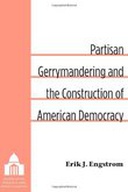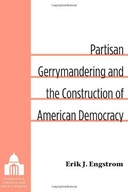Explore

Partisan Gerrymandering and the Construction of American Democracy
Erik J. Engstrom
2013
4 Ungluers have
Faved this Work
Login to Fave
Engstrom evaluates redistricting plans and their electoral results from all states from 1789 through the 1960s, revealing that districting practices systematically affected the competitiveness of congressional elections; shaped the partisan composition of congressional delegations; and, on occasion, determined control of the House of Representatives. Erik J. Engstrom offers a historical perspective on the effects of gerrymandering on elections and party control of the U.S. national legislature. Aside from the requirements that districts be continuous and, after 1842, that each select only one representative, there were few restrictions on congressional districting. Unrestrained, state legislators drew and redrew districts to suit their own partisan agendas. With the rise of the “one-person, one-vote” doctrine and the implementation of the Voting Rights Act of 1965, however, redistricting became subject to court oversight. Engstrom evaluates the abundant cross-sectional and temporal variation in redistricting plans and their electoral results from all the states, from 1789 through the 1960s, to identify the causes and consequences of partisan redistricting. His analysis reveals that districting practices across states and over time systematically affected the competitiveness of congressional elections; shaped the partisan composition of congressional delegations; and, on occasion, determined party control of the House of Representatives. “Partisan Gerrymandering and the Construction of American Democracy provides a rich look at the practice of gerrymandering. It is a nice mix of history and quantitative analysis. . . . It will be the definitive work on the subject for decades to come.” —Charles Stewart, MIT Erik J. Engstrom is Associate Professor of Political Science at the University of California, Davis. This title was made Open Access by libraries from around the world through Knowledge Unlatched.
This book is included in DOAB.
Why read this book? Have your say.
You must be logged in to comment.
Rights Information
This work has been claimed by University of Michigan Press.
Downloads
This work has been downloaded 1540 times via unglue.it ebook links.
- 187 - pdf (CC BY-NC-ND) at OAPEN Library.
- 286 - pdf (CC BY-NC-ND) at Unglue.it.
- 493 - pdf (CC BY-NC-ND) at Internet Archive.
Keywords
- American Politics
- Apportionment (politics)
- Appotionment
- Congressional district
- Democratic Party (United States)
- Election law
- Gerrymandering
- History
- KUnlatched
- Nonfiction
- Political Science
- Political Science & Theory
- Political Science / American Government
- Political Science / American Government / Legislative Branch
- Political Science / Political Process
- Political Science / Political Process / Elections
- Politics
- Politics & government
- Redistricting
- Republican Party (United States)
- Social conditions
- Society & Social Sciences
- State legislature (United States)
- thema EDItEUR::J Society and Social Sciences::JP Politics and government::JPA Political science and theory
Links
DOI: 10.1353/book.27372web: http://hdl.handle.net/2027/ku01.157
Editions



